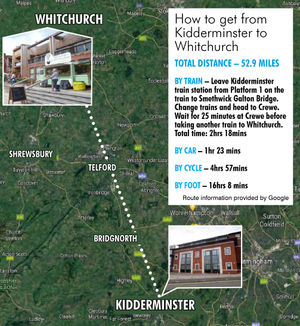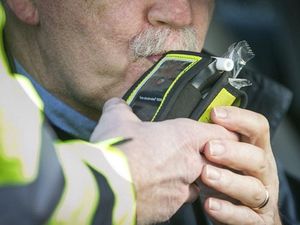Stranded: Cleared court suspect is 'dumped' 53 miles from his Shropshire home
A man freed by magistrates was faced with a 53-mile journey back to Shropshire as a result of controversial new court arrangements.

The defendant was arrested in Whitchurch and held overnight before being taken to court in Kidderminster by police bus because all remand hearings involving Shropshire are now held in the Worcestershire town.
But after the case against him was dismissed within 10 minutes, he was told he would have to find his own way home.
Solicitors today highlighted the issue as the latest example of problems surrounding the movement of court cases from Telford to Kidderminster.
They say vulnerable people freed from the courts are effectively being dumped on the street and left to fend for themselves, miles from home.
Defence solicitor Emma Lineton highlighted the issue of her client, who was accused of breaching a restraining order but immediately told by magistrates that he had no case to answer.

She said: “The public won’t have a huge amount of sympathy for people affected because they are in the criminal justice system – but this whole situation is less than ideal. It always used to be the principle that people should be tried locally, it is not happening and justice is being delayed.”
The decision to move hearings to Kidderminster has been roundly criticised.
Ms Lineton, of Hatchers Solicitors in Shrewsbury, said the proceedings at Kidderminster Magistrates Court were discontinued “within 10 minutes” when it was accepted that the man had not breached the order. And, after being taken to Kidderminster by police bus, he was simply released on to the street and told to make his own way back to Whitchurch.
The route is a complicated one, requiring a train to Shrewsbury, changing at Smethwick Galton Bridge and Crewe, and costs about £16 – paid for by the taxpayer through a travel warrant.
Solicitors have been campaigning against the new arrangements, in which remand hearings have moved from Telford to Kidderminster. Defendants due in court are held overnight in cells before being taken on an early bus to Kidderminster. And those who miss that bus are forced to wait until the next day.
The changes mean legal teams have to make the long journey and many cases are delayed because of the absence of either a defendant or solicitor.
There are also concerns that people who may be vulnerable are being delivered to court in Kidderminster but then expected to make their own way back to Shropshire if released by the court.
Ms Lineton said: “In this case my client was produced in custody having been remanded and within 10 minutes of coming before the court the prosecutor decided to discontinue proceedings because there was no evidence. That meant he had to leave the court and travel all the way back to Whitchurch.”
She added: "I think the original plan was to save on costs and have the court system run more smoothly – and in my own view it is having the opposite effect.”
Ms Lineton said that some other remand cases, involving people who have drug problems, are initially taking place in Kidderminster before having to be adjourned to Telford Magistrates Court at a later date.
She said the reason for moving the cases back is that Kidderminster-based staff are not able to deal with drug rehabilitation requirements from outside the area.
The decision to move remand hearings to Kidderminster has been the focus of criticism from a number of sources, including local defence solicitors, the region’s police and crime commissioner, and a long-standing Shropshire magistrate.
The Ministry of Justice has defended the decision, which it says was made to save money for the taxpayer and improve management at Telford Magistrates Court.
A spokesman for the MoJ said: “We are investing more than £1 billion to reform and modernise the justice system – to deliver swifter justice and provide better value for the taxpayer.
Following a public consultation, remand cases were moved from Telford to Kidderminster Magistrates Court to improve listings and trial management at Telford.”
The situation has also led to accusation from solicitors that the police are having to “babysit” people in custody.
Because only one bus a day leaves from Telford Police Station for Kidderminster, at about 7.30am, anyone who hands themselves in after that time has to be held in a cell until the following day.
Worcester police even issued guidance on “the best time” for people to hand themselves in with a note on the town’s police station, which was later removed.
The note said “the best time to hand yourself in is between 10pm and 4am to enable transport arrangements to be made to Kidderminster”.
West Mercia’s Custody Chief Inspector, Ian Wall said the note had been written in good faith, but had since been taken down.
He added: “Individuals wanted by the courts often hand themselves in at police stations and we would encourage them to do so at the earliest opportunity to allow us to process them efficiently through the system prior to any court appearance.”




